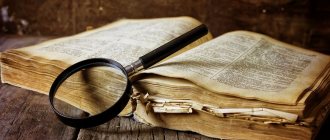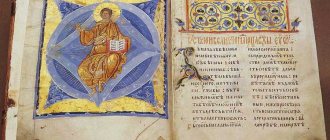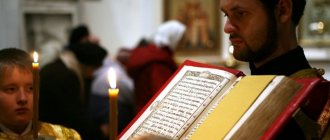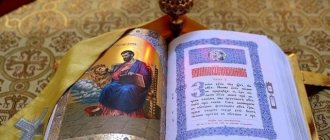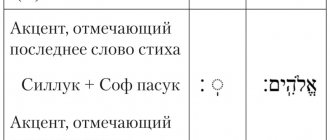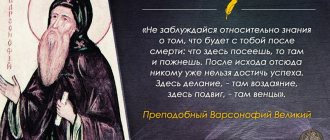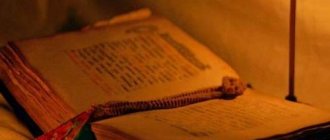| Alexander Men | |
| Occupation: | priest of the Russian Orthodox Church, theologian and preacher |
| Date of Birth: | January 22, 1935 |
| Date of death: | September 9, 1990 |
| Ethnicity: | Jew |
| Religion: | Orthodox |
| UDC |
Alexander Vladimirovich Men
(*January 22, 1935 - September 9, 1990) - a Jew, a second-generation convert, a Judaizer "priest", [1] provocatively killed by a terrorist (hacked to death with an ax).
See here Metropolitan Anthony: Open letter to priest Alexander Menu
Biography[edit]
Born in Moscow, into a family of Jewish origin: both mother and father.[2] The mother’s maiden name was Vasilevskaya (the ancestors were “obviously from Poland.”[2] My father studied at a religious Jewish school as a child; my mother was drawn to Christianity from her youth.
At the age of six months he was baptized together with his mother, who belonged to the so-called. Catacomb Church. He studied at the Moscow Fur Institute (1953-1954), then at the Irkutsk Agricultural Institute (1955-1958), from where he was expelled for religious beliefs. A month after his expulsion, he was ordained a deacon, and in 1960 (after graduating from the Leningrad Theological Seminary) - a priest. In 1965 he graduated from the Moscow Theological Academy in absentia.
He served in a number of parishes near Moscow. A unique combination of broad erudition, openness to secular culture, science, other faiths, non-Christian religions and deep ecclesiastical roots, which he received in the Catacomb Church, put Me among the leading Christian preachers.
The main work of Father Alexander is the book about Jesus “Son of Man” (Brussels, 1969, 2nd ed. M. 1991), as well as the series “In Search of the Path, Truth and Life” (vol. 1-6, Brussels, 1970-; 2 ed. - M., 1991-1992), in which the author examines the history of non-Christian religions as the path to Christianity in the struggle between magism and monotheism.
Father Alexander is also the author of the books “Sacrament, Word, Image” (Brussels, 1980, 2nd ed. M. 1991) (first edition entitled “Heaven on Earth” (Brussels, 1969), “Where did all this come from?” (Naples, 1972), “How to read the Bible?” (Brussels, 1981), Biblical Dictionary (approx. 10 thousand terms, Moscow, 2002 (posthumous edition)) and numerous articles mainly of preaching and apologetic content. The works of Father Alexander have been translated into English , Lithuanian, Polish, Ukrainian and French languages.
Father Alexander Men is one of the founders of Christian “samizdat” in the 1960s. Until the mid-1980s. his works were published mainly abroad (under the pseudonyms E. Svetlov, A. Bogolyubov, A. Pavlov). Since the mid-1980s. Father Alexander Men is one of the most popular Christian preachers (including in the media).
Some representatives of Orthodox and near-Orthodox circles assessed Father Alexander’s activities as “non-Orthodox”; during his speeches, Father Alexander repeatedly received threatening notes.
He is revered by many Russian Catholics, who consider him a holy martyr.
Nationalist views[edit]
He allowed himself Jewish-nationalist attacks against Orthodox texts based on the Divinely inspired text of the Gospel:[3]
In 1975, he gave an interview to the samizdat magazine “Jews in the USSR” under the title “Jews and Christianity”, reprinted a year later in the “Vestnik RKhD”. In it about. A.M. calls the Church’s glorification of St. “erroneous.” Muchch. Gabriel of Bialystok and Evstratiy of Pechersk. Considering the feat of these saints (acceptance of martyrdom by the Jews) unreliable, he recognized the possibility of their decanonization... When asked about the presence of sharp attacks against Jews in Orthodox liturgical texts, Fr. A.M. replied that they were a relic of medieval customs and would probably soon be removed from worship. We were talking about texts from the “Sequence of the 12 Gospels of the Passion of the Lord” and the Matins of Great Saturday: “For the good that You have done to the Jewish race, crucify You, condemn Thee, and give Thee drink of blood and gall.”; “O Christ, the birth of Jewry, was not content with betrayal, but shook his heads, bringing blasphemy and abuse; “The council of the murderers of God, the lawless tongue of the Jews, frantically calling to Pilate, and saying: crucify the innocent Christ.” This is Fr.'s assessment. A.M. Patristic texts: St. Melito of Sardinia “On Easter”, the text of which formed the basis of the antiphons of the Matins of Great Heel, the Trisong of St. Cosmas of Maium and troparions of the Cross and Sunday Canons of Octoechos “The Christ-killer and the Prophet-killer were the Jewish multitude...”, authored by St. John of Damascus.
In the late 40s Men decided to become a priest
1943 became a turning point for all Soviet people. Fascist troops were defeated at Stalingrad and on the Kursk Bulge.
Another important event happened for the Orthodox. Stalin allowed the choice of a patriarch. The believers took heart.
1948
this year Alexander Men joined the church
In the 40s in Moscow, the secret Boris Aleksandrovich Vasiliev organized an underground circle. In his apartment, he organized lectures on culture and religion, and discussed the Holy Scriptures with like-minded people. The circle included Alexander’s mother, Elena Semyonovna. She brought her son to Vasiliev.
B.A. Vasiliev helped Alexander finally take the pastoral path
In 1948, Alexander decided to become a priest. He began serving at the altar of the Church of the Nativity of John the Baptist on Krasnaya Presnya.
Murder[edit]
Cross at the scene of the murder in Semkhoz
Father Alexander was killed on September 9, 1990. That morning he was in a hurry to go to church: he had to be on time for the liturgy. A man ran up to him and handed him a note. Men took his glasses out of his pocket and began to read. At this time, another man jumped out of the bushes and hit him from behind with an ax. Drenched in blood, the priest headed towards the station. Then, losing strength, he turned back towards the house. He managed to crawl to the gate. “Who are you, Father Alexander?” - the woman asked. “No, no one, I myself!” answered Men: he did not want or could not name his killers.
My funeral took place on September 11th.
Despite the personal orders of the presidents of the USSR and Russia, the murder remained unsolved.
Biography
Alexander Men is a Russian clergyman who has faced many difficulties. He survived attacks on the church and persecution of believers by the Soviet authorities, he had to secretly distribute his own books, and change parishes against his will.
Priest Alexander Men
People loved Father Alexander for his spiritual openness and sociability; the man was known as an excellent conversationalist, able to listen carefully and give practical advice to everyone who knocked on the doors of his house and church.
Reviews of the activities and works of Archpriest Alexander Men[edit]
Positive reviews[edit]
Many Orthodox people positively evaluate the activities and works of Fr. Alexandra Me. Thus, according to Patriarch Alexy II,
Father Alexander was a talented preacher of the word of God, a good shepherd of the Church, he had a generous soul and a heart devoted to the Lord. The murderers did their dirty deed at a moment when he could still have done so much for the spiritual enlightenment and nourishment of the children of the Church. Not all of his judgments were completely shared by Orthodox theologians, but none of them contradicted the essence of Holy Scripture. Where it is precisely emphasized that there must be differences of opinion among you, so that the most skillful may appear (1 Cor. II, 19).
Metropolitan Anthony (Bloom) of Sourozh, many years after the death of Fr. Alexandra spoke about him very emotionally:
We don’t dare talk about our abandonment, our loneliness, our orphanhood! Father Alexander did not die, but joined the Divine Life, remained for his own - known and unknown, a Good Shepherd, a prayer book, an intercessor, an intercessor! And he calls everyone who loved him, who saw in him the image of a true Christian to the Way of the Cross and to the glory of the Resurrection! “Be my followers, just as I am a follower of Christ!”
According to Archbishop Michael (Mudyugin),
Father Alexander put all his knowledge, encyclopedic erudition, the most diverse interests in science, fiction, art, all his talents given to him from God, into the service of preaching. He preached tirelessly. He always preached on principle, and in a language accessible to his contemporaries... He was a man of extraordinary spirituality who led an ascetic life and ended it as a martyr. But on the blood of martyrs, as has been known since ancient times, the seeds of Christian evangelism sprout, the Church of Christ grows and strengthens... Father Alexander was truly a prophet of modern times and a harbinger of evangelization of the entire ministry of the Orthodox Church, evangelization that corresponds to the urgent needs and aspirations of the Orthodox people.
Priest Georgy Chistyakov believes that
Father Alexander was one of the people who are not afraid. He was not afraid to go to hospitals to see the seriously ill and dying, although this was strictly prohibited, and he was not afraid to preach and, moreover, talk about faith with children, almost openly violating Soviet legislation. He was not afraid of the language of his era and, unlike almost all of his brothers, he knew how (like the Apostle Paul) to speak with the “pagans” about Christ in the language of these pagans. He was not afraid to synthesize the experience of his predecessors, who were very different and sometimes mutually exclusive, and he did this surprisingly well, because he did it not at the level of man, but at the level of God’s love. I wasn't afraid of new things.
Criticism[edit]
At the same time, representatives of conservative circles of the Russian Orthodox Church claim that some statements by Fr. Alexandra Me contradict the fundamentals of Orthodox teaching and are of a theosophical nature (Fr. Alexander himself never identified his views with theosophy). He was also accused of sympathizing with Catholicism. The famous Orthodox theologian A.I. Osipov and the missionary Deacon Andrei Kuraev did not recommend the book by Fr. Alexandra Menya for getting acquainted with Orthodoxy (Osipov A.I. “Course of lectures on apologetics, 5th year of MDS, second half of the year”, “Course of lectures on basic theology, 4th year of MDS”). The following quotations express the ecumenical and, according to some, theosophical ideas of Fr. Alexandra Me.
“The Origins of Religions”, Chapter 4 “Man Before God”
Perhaps the difference in the knowledge of God between religious geniuses, such as Francis of Assisi, Teresa of Avila, Meister Eckhart, Seraphim of Sarov, and ordinary people is that for the latter, a meeting with God is like an instant flash of lightning, which is often followed by darkness again, and the first partook of the Divine life with their whole being and themselves became its bearers.
“History of Religions”, Volume 3, Chapter 5 “The Mystery of the Higher Self”
Following the path laid out by contemplation, the Indian Brahmins come to the same thing that all mystics came to, no matter what time and no matter what people they lived in. Yajnavalkya and Buddha, Plotinus and the Areopagite, Meister Eckhart and Gregory Palamas, the Kabbalists and Nicholas of Cusa, Jacob Boehme, Ruysbroeck and many other clairvoyants of East and West, with a unanimity that involuntarily leads to awe, proclaim what they have learned, having reached the very the limits of existence. All of them as one testify that everything conceivable and imaginable disappears there, that there is nothing there and at the same time - ineffable Completeness. There it is impossible to find any of the properties of the world, nature and spirit; there is neither good nor evil, neither light nor darkness, neither movement nor rest. There reigns something that surpasses the deepest thought of man, surpasses existence itself. In the sacred darkness that hid the foundation of the foundations, they felt the reality of Existence, the Absolute. A terrible, unbearable secret!..
“Letters to spiritual daughter Alexandra Orlova-Model”
Ecumenism has two sources: either a truly broad and deep spirituality that is not afraid of others, or a superficial confusion of everything into a heap. Of course, I am for the first type of ecumen. But few reach it. Hence your observations. In the abbot’s words about the saints that they are “strangers,” there is not only limitation, but an unwillingness to accommodate other experiences. And the specifics of this experience do not concern the Gospel as such. Their source is cultural tradition and ethnopsychology... To say that 700 million Catholics and 350 million Protestants are in error, and we alone are the true church, means to be in insane pride, unjustified in any way.
The murdered priest Daniil Sysoev was described by Archpriest. Alexandra Me as a heretic who falls under the anathemas of the Local and Ecumenical Councils of the Orthodox Church:
Of course, Rev. Men (whom I cannot call father) is a heretic (see Rule 15 of the Double Council) for he teaches heresies condemned by the Fathers and Councils.
Here is a list of his heresies:
1. Manichaeism. — The doctrine of the complicity of Satan in the creation of the world, the result of which was the supposed evolution that took place.
2. The doctrine of man as a transformed monkey. Contradicts the definition of the 5th Ecumenical Council against Origen (it was proclaimed there that the soul and body appeared simultaneously. Regarding the teaching of Me, his opinion was condemned by the Synod of the Moscow Patriarchate of December 7, 1935 in the case of Archpriest S. Bulgakov)
3. Rejection of sacred inspiration. Scriptures (see anathemas of the week of Orthodoxy).
4. Rejection of original sin and postulation of the independence of death from human sin (see 124 rights of the Council of Carthage)
5. Rejection of the existence of a personal Adam and the introduction of the Kabbalistic doctrine of Adam Kadmon.
6. Rejection of the authorship of almost all Old Testament books (see anathemas against Theodore of Mopsuestia by the 5th Ecumenical Council).
7. In the doctrine of the Church - the acceptance of the theory of branches (condemned by the Jubilee Council in 2000).
8. Syncretism (which has already been discussed on the forum) condemned (together with theosophy) at the 1994 Council.
9. Encouraging magic and extrasensory perception (in a lecture to students at a school of psychics) entails 25 years of excommunication from Communion. And almost the only one that brings down two punishments on the priest at once - defrocking and excommunication. (Rules 6 of the Ecumenical Council, Basil the Great, Gregory of Nyssa, etc.)
There is no longer any need to talk about such blasphemies as the rejection of the reality of the Flood, the literalness of the Six Days, the Tower, the existence of Adam, Noah, Isaac, Enoch. Attributions to the book of the prophet. Isaiah to two authors. Slander of the Old and New Testament saints (examples of which have already been given both on the forum and in the unfairly slandered work of Father Sergius Antiminsov - let My apologists show at least one distorted or taken out of context quotation in this work). All these statements put Me beyond not only the Orthodox Church, but also simply Christianity (after all, the teaching of its inspirer Chardin was condemned even by the Pope).
In general, I have not met a person whom I would lead to the true Christ, as the Church knows Him.
[4]
At the institute, Alexander is preparing to serve God
Despite his preparation and desire to enter the Theological Academy, Alexander decided to get a secular specialty. In 1953, he entered the hunting department of the Moscow Fur Institute.
Men recalled his years of study at the university with pleasure. During his studies, he thoroughly mastered philosophy, read Spinoza, Descartes, Leibniz. I read Orthodox philosophers: Florensky, Bulgakov, Berdyaev, Lossky. The main authority for Alexander was the philosopher Vladimir Solovyov.
Student Men worked in the diocesan administration
At the same time, Men began his conscious writing activity. He writes two books on church history: the first volume, “The Ancient Church,” he will finish in 1956, the second, “The Middle Ages,” in 1957.
At the institute, Men married Natalya Fedorovna Grigorenko.
The student’s passion for Orthodoxy did not go unnoticed, especially since a new round of theomachism began in the late 50s. In 1958, Alexander was expelled from the university right before the state exams.
Bibliography[edit]
- History of religion. In search of the Path, Truth and Life (in 7 volumes) (Moscow, 1991-92) Volume 1. Origins of religion
- Volume 2. Magic and Monotheism. The religious path of humanity before the era of the great Teachers
- Volume 3. At the Gates of Silence. Spiritual life of China and India in the middle of the first millennium BC
- Volume 4. Dionysus, Logos, Fate. Greek religion and philosophy from the era of colonization to Alexander
- Volume 5. Messengers of the Kingdom of God. Biblical prophets from Amos to the Restoration (7th-4th centuries BC)
- Volume 6. On the threshold of the New Testament
- Volume 7. Son of Man
- Volume 1. In Search of the Path, Truth and Life
- Volume 1. A-I
Alexander Men. “Correspondence” //
Bulletin of the RHD
. - 1992. - No. 165 II. — P. 44-73.
Personal life
Alexander Men was married to a Ukrainian woman, Natalya Grigorenko. In 1957, the couple had a daughter, Elena, who would become an icon painter in the future. And three years later, the family was replenished with an heir. Son Mikhail Men made a career in Russian politics, served as governor of the Ivanovo region, and in 2013 sat in the chair of the Minister of Construction and Housing and Communal Services of the Russian Federation.
Alexander Men and his wife Natalya
The priest's house was always open to guests. Friends, parishioners and strangers gathered here to hear about God. Alexander Vladimirovich and his family lived modestly, but eyewitnesses say that the house was filled with inexplicable light and warmth, every thing had its place. The archpriest did not disdain to do housework when his wife Natalya Fedorovna was away, and personally prepared treats for the guests.
Father Alexander also went down in history as a philanthropist, the creator of the Mercy Group, which arose on the basis of a children's clinical hospital. This is one of the largest charity projects in Russia.
[edit] Career
Since June 1, 1958 - deacon.
Since September 1, 1960 (after graduating from the Leningrad Theological Seminary) - priest. He became the 2nd priest in the Church of the Intercession of the Blessed Virgin Mary in Petrovsky-Alabin, and a year later he replaced the rector of the temple.
He became one of the founders of religious samizdat in the 60s.
In 1964, a search was carried out at his place.
In 1974 Yu.V. Andropov wrote about the group Me.
He worked in a number of parishes near Moscow.
In 1989-1990 - rector of the Presentation Church in Novaya Derevnya (Pushkino).
His works were of an educational nature and on the history of Jews, Judeo-Christianity, etc.
The first public lecture on Christianity was given by Alexander Menu
May 11, 1988
I gave my first public lecture. The wall separating people from Orthodoxy has been broken through
1988 - Men gave a lecture at the Moscow Institute of Steel and Alloys.
Gorbachev loosened control over the church. It became possible to preach openly. The hierarchs of the Orthodox Church issued a carte blanche menu for any missionary activity.
Before his death, in two years he gave more than two hundred lectures on a variety of topics. Father Alexander knew how to find a language with any audience.
The ease of communication with a wide variety of people, from atheists to followers of non-Christian religions, ensured the success of sermons and the growth of the number of enemies
